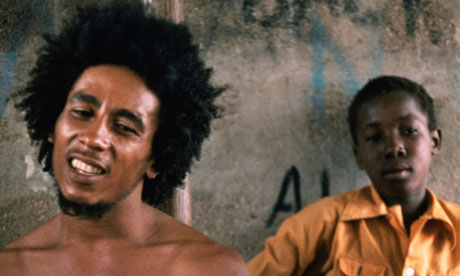
Directed by Kevin Macdonald, and – just as importantly – executive-produced by Ziggy Marley and Island Records founder Chris Blackwell, this is a long and very enjoyable hagiography of Bob Marley: a languorously drawn-out act of homage to the adored Rastafarian star and musical hero.
It is a fundamentally respectful film. If any interviewee were to mention the possibility that Marley had nicked the Banana Splits TV theme tune for Buffalo Soldiers, then that interviewee would undoubtedly be taken out and savagely beaten, with the cameras rolling. As it happens, the subject doesn't come up. Macdonald's overwhelming warmth and passion suffuses the picture, and the testimony he gets from Marley's friends, family and fellow band members has pungency and insight. Macdonald gives a vivid picture of the man who rose from dirt-poor beginnings in Trench Town in Kingston to become an international legend, Jamaica's answer to Ali or Che.
Perhaps Macdonald doesn't look too hard at the pain Marley must surely have caused in his private life, beyond stating the number of children he had with many different partners, and recording Marley's slightly chilling denial that he was married (to backing singer Rita Marley) on the grounds that this was a reactionary encumbrance that he did not recognise. The film is also relatively incurious on the subject of money and Marley's relationship with his great sponsor, Blackwell – although it briefly, and without comment, allows us to hear the Wailers' one-time guitarist Peter Tosh refer to him acidly as "Chris Whitewell". Macdonald shows some wonderful black-and-white still photographs of the Wailers on tour. These are well deployed, though maybe Macdonald should have acknowledged the photographers explicitly.
What a compelling story it is. Macdonald puts Bob Marley at the centre of a larger narrative: the story of Jamaica itself, striving to find its way past two different cultural empires, Britain and the US, and to find a peaceful solution to sectarian gangsterism and crime. The director shows us the extraordinary hysteria that greeted Emperor Haile Selassie's visit to Jamaica in 1966, and later the scenes of public mourning for Marley's death in 1981 – and simply allows us to register that the demonstrations for Marley were greater in their intensity.
Marley was the son of a white man, a plantation overseer of English descent called Norval Marley, who appears to have absented himself soon after Bob was born. His mother was Cedella Booker, an Afro-Jamaican woman who brought up Bob on her own, evidently without complaint. Again, the movie doesn't labour the point, but Marley's own sexual politics may not have travelled so far from his absent father.
Bob Marley's mixed-race background could well have given him the outsider's edge, the outsider's passion to get ahead, and the outsider's wound – the private pain that created his music. The movie makes a very good case for Marley as a poet of simplicity and force. His first single, recorded when he was just 16 years old, was Judge Not: "I know that I'm not perfect/ And that I don't claim to be/ So before you point your fingers/ Be sure your hands are clean." The thought of a teenager writing and singing that, with a guileless kind of indignant pain, is somehow very moving.
Also compelling is the song Bob Marley wrote as a result of being rejected by his father's side of the family – Corner Stone: "The stone that the builder refused/ Will always be the head corner stone." Marley's music is often suffused with this sense of destiny, his own destiny, and that of Jamaica itself. From certain angles he looks like an almost Napoleonic figure, wreathed in smoke that isn't from the battlefield. Actually, his chief passion, apart from music, could well have been football. When in England in the 70s, the Wailers played regular five-a-side matches in Battersea Park in south London – including once, reportedly, against a team from the National Front. The film does not record the final score.
Marley emerges from this film as a passionate, if somewhat indistinct supporter of peace, and one who was uneasy about being associated in the public mind with any one politician. During one free concert, he even dragged the socialist Michael Manley up on stage to shake hands publicly with the conservative leader Edward Seaga. This was Marley's own Camp David moment, and much more sincere than any masterminded by a politician. Macdonald discusses the chaotic and bungled assassination attempt that Marley survived before these free concerts were staged. "A professional job?" asks Macdonald of one witness. "As professional as it gets in Jamaica," is the cheerful reply.
Cliche and stereotype paints Jamaica as dreamy, sunny, laidback. Marley, on the other hand, emerges as driven, industrious, competitive, a natural leader of charisma who was political in the broadest sense, but never boxed in by politics and who never sold out. Macdonald persuasively suggests that Bob Marley's idealism and boyish innocence survived until the very end.

